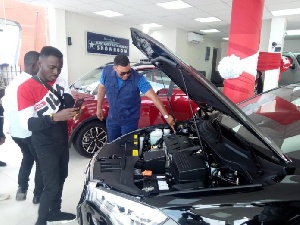 Kantanka Automobile CEO, Kwadwo Safo Jnr, explaining a point to the media at the company
Kantanka Automobile CEO, Kwadwo Safo Jnr, explaining a point to the media at the company
The Kantanka Automobile Company Limited has called on government to institute a quota system to enable it market and sell its brand of indigenous vehicles.
The company said successive governments’ neglect and the lack of support in various ways, is hobbling the company’s growth.
CEO Kwadwo Safo Jnr, told the Goldstreet Business that the major challenge confronting the company is the payment of duties on the vehicles, which are domestically manufactured.
The company pays 29.5 percent duty, comprising five percent import duty, import VAT 17.5 percent and other charges constituting five percent, on completely knocked down vehicles (CKD) which attract no tax in other countries including Nigeria.
“In India, and other countries we visited, the quota system is put in place to enable them give priorities to their brands,” Safo said.
Currently Kantanka Automobile produces 200 vehicles a month, with 50 percent robotic application. It plans to go fully robotic by next year.
The company also said a current move by government to bring in two new foreign vehicle assembling companies into the country, before end of year, makes mockery of the ‘made in Ghana’ campaign.
Last week, Senior Minister, Yaw Osafo Marfo hinted at the establishment of two new foreign automobile plants in the country.
“In two separate MoUs submitted to the government about two months ago, which had already been approved, the two companies expressed interest and asked permission to build their assembly plants in the country and we have certain incentives for them ,” the Senior Minister disclosed.
At the same forum, the Director General of the Ghana Standards Authority (GSA), Prof. Alexander Nii Oto Dodoo, assured Ghanaians that vehicles produced by Kantanka Automobile meets the required standards.
However, Safo mentioned that the announcement from the Senior Minister comes as no surprise to the company as it has always been like that.
“In 2016 when this whole campaign of promoting made in Ghana started, we wanted to have our cars displayed at one of the events organized by government but we were not given the permission,” he said.
The company’s General Manager, Mr. Francis Kudjordjie, explaining some of the company’s new strategies for entering other markets in the sub-region, said “we’ll soon start manufacturing in Tanzania and other countries on the continent.”
He noted that plans are far advanced to go into motorcycle production, mini buses, and electric cars.
“As we work towards that, our immediate plan is to open showrooms in various locations nationwide so as to bring our products closer to clients,” he said.